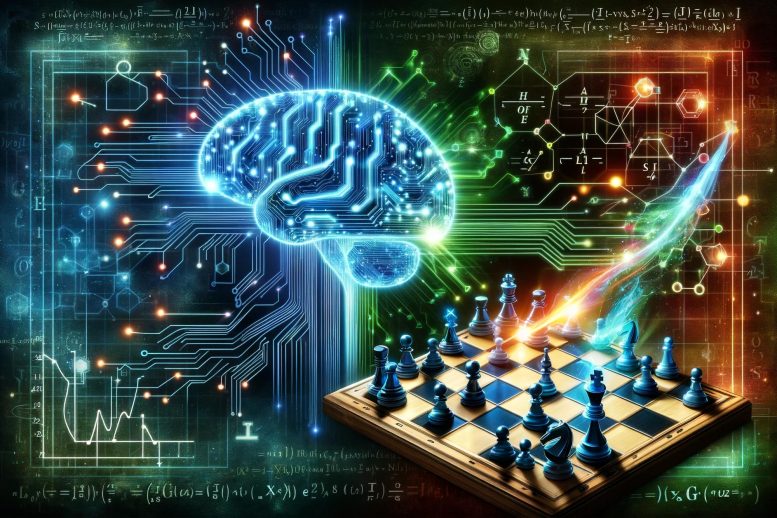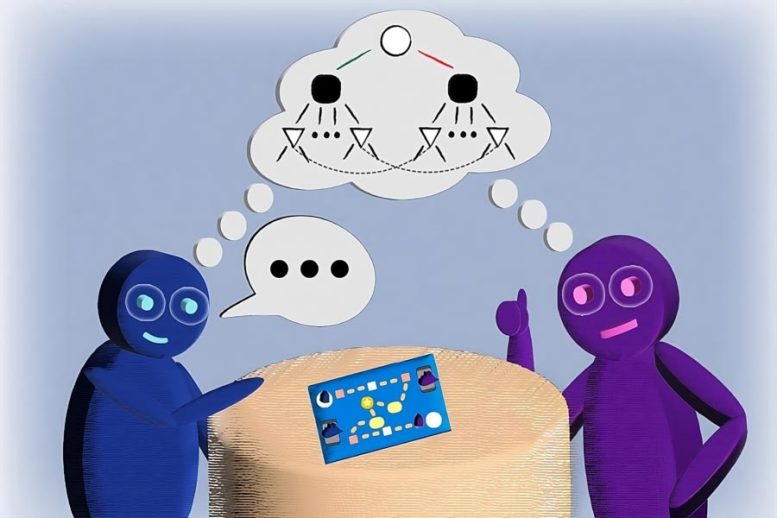
MIT CSAIL researchers developed a “consensus game” to improve AI text understanding and generation by treating the process as a game where one part generates sentences and another part evaluates them. This method, called equilibrium ranking, significantly enhances AI performance across tasks like reading comprehension, math problem-solving, and dialogue. Credit: SciTechDaily.com
MIT Computer Science and Artificial Intelligence Laboratory (CSAIL) researchers have created a similar “game” to help improve how AI understands and generates text. It is known as a “consensus game” and it involves two parts of an AI system — one part tries to generate sentences (like giving clues), and the other part tries to understand and evaluate those sentences (like guessing the secret message).

MIT researchers’ “consensus game” is a game-theoretic approach for language model decoding. The equilibrium-ranking algorithm harmonizes generative and discriminative querying to enhance prediction accuracy across various tasks, outperforming larger models and demonstrating the potential of game theory in improving language model consistency and truthfulness. Credit: Alex Shipps/MIT CSAIL
Game-Theoretic Approach to AI
The researchers discovered that by treating this interaction as a game, where both parts of the AI work together under specific rules to agree on the right message, they could significantly improve the AI’s ability to give correct and coherent answers to questions. They tested this new game-like approach on a variety of tasks, such as reading comprehension, solving math problems, and carrying on conversations, and found that it helped the AI perform better across the board.
Traditionally, large language models answer one of two ways: generating answers directly from the model (generative querying) or using the model to score a set of predefined answers (discriminative querying), which can lead to differing and sometimes incompatible results. With the generative approach, “Who is the president of the United States?” might yield a straightforward answer like “Joe Biden.” However, a discriminative query could incorrectly dispute this fact when evaluating the same answer, such as “Barack Obama.”
Balancing AI Responses With Equilibrium Ranking
So, how do we reconcile mutually incompatible scoring procedures to achieve coherent, efficient predictions?
“Imagine a new way to help language models understand and generate text, like a game. We’ve developed a training-free, game-theoretic method that treats the whole process as a complex game of clues and signals, where a generator tries to send the right message to a discriminator using natural language. Instead of chess pieces, they’re using words and sentences,” says Athul Jacob, an MIT PhD student in electrical engineering and computer science and CSAIL affiliate. “Our way to navigate this game is finding the ‘approximate equilibria,’ leading to a new decoding algorithm called ‘equilibrium ranking.’ It’s a pretty exciting demonstration of how bringing game-theoretic strategies into the mix can tackle some big challenges in making language models more reliable and consistent.”
When tested across many tasks, like reading comprehension, commonsense reasoning, math problem-solving, and dialogue, the team’s algorithm consistently improved how well these models performed. Using the ER algorithm with the LLaMA-7B model even outshone the results from much larger models. “Given that they are already competitive, that people have been working on it for a while, but the level of improvements we saw being able to outperform a model that’s 10 times the size was a pleasant surprise,” says Jacob.
Game On
“Diplomacy,” a strategic board game set in pre-World War I Europe, where players negotiate alliances, betray friends, and conquer territories without the use of dice — relying purely on skill, strategy, and interpersonal manipulation — recently had a second coming. In November 2022, computer scientists, including Jacob, developed “Cicero,” an AI agent that achieves human-level capabilities in the mixed-motive seven-player game, which requires the same aforementioned skills, but with natural language. The math behind this partially inspired the Consensus Game.
While the history of AI agents long predates when OpenAI’s software entered the chat in November 2022, it’s well documented that they can still cosplay as your well-meaning, yet pathological friend.
The consensus game system reaches equilibrium as an agreement, ensuring SciTechDaily